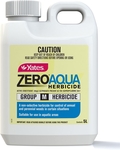Good value considering weed killer prices have gone up so high lately due to supply issues.
5L concentrate will last a very long time for a home owner.
Please be advised that this is a non selective weed killer (360 Glyphosate) that will kill everything so don't spray wanted plants and lawns (spot spray on clear weather conditions, no wind to avoid spray drift).
Features:
Suitable for use on a number of aquatic weeds in fresh water, on sides or banks of streams, lakes and in channels and drains
Rain proof after 6 hours
Non-residual
When spraying large areas, add Yates Easy See Spray Dye to reduce product wastage.
Travels from the foliage to the roots, killing weeds roots and all
Yates Zero Aqua provides effective, economical and easy control of weeds and grasses in rockeries, garden beds, paths, driveways, along fence lines and lawn edges.
A non-selective herbicide, it is designed to control annual and perennial weeds in certain situations and is suitable for use in aquatic areas. Absorbed by the plant foliage and green stems Yates Zero Aqua moves through the plant from point of contact to root system killing weeds roots and all.


360g/L Glyphosate as isopropylamine salt